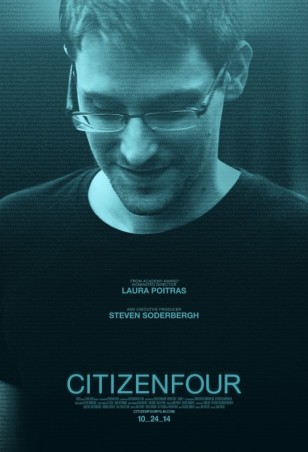Citizenfour (Laura Poitras, 2014)
I am unfamiliar with the work of documentary filmmaker Laura Poitras, but after watching Citizenfour I feel an urgent need to find two of her previous films, My Country, My Country and The Oath, both of which (I understand) similarly tackle issues of liberty and democracy in a post-9/11 world. We learn at the start of her new movie that – together with Citizenfour – they comprise an unofficial trilogy that analyzes the after effects of the terrorist attacks that so shocked (and transformed) the United States and its security apparatus. If they are even remotely as powerful as her new work, I expect to be transfixed.
Citizenfour tells the story of Edward Snowden, the former Booz Allen Hamilton employee who, as a contractor for the NSA, leaked classified documents to the world through journalist Glenn Greenwald and a few select others, including Ewen McAskill and Jeremy Scahill. Both Greenwald and McAskill appear in the movie – the former much more than the latter – and what makes the film so fascinating is the realization that we are watching a behind-the-scenes making-of document of very recent (and turbulent) history. Unless you were asleep in 2013, you surely remember seeing Snowden’s interview with Greenwald in real time. Now imagine seeing the events leading up to that disclosure. It’s pretty exciting. Even if one believes that Snowden is a traitor who should face justice for his actions, the film is worth seeing, since we’re right there with him.
When the film begins, those of us with no prior knowledge of Poitras discover that she has been under U.S. Government surveillance ever since making My Country, My Country. When she receives an encrypted email, signed “citizenfour,” from an unknown source, asking her to journey to Hong Kong for a meeting (along with Glenn Greenwald), she accepts. She is, after all, an investigative filmmaker, and what the mysterious writer promises to reveal is intriguing. Once she and Greenwald arrive, they meet a nervous and thoughtful young man, holed up in a hotel room, who, over the course of a week, tells them who he is, what he has discovered, and why he thinks the world should know. Intriguing, indeed. And frightening, too.
For what Snowden has to say is that the United States, in the name of domestic security – is spying, illegally, on not only foreigners but its own citizens, amassing an ever-growing database with the intent of identifying potential terrorists and subversives (sounds a bit like Captain America: The Winter Soldier, doesn’t it?). Given his feelings about the nature of democracy and liberty, and the importance of privacy, Snowden finally decided that he could not keep this information to himself. And so he acted. He chose to go through journalists rather than just publish the data online, as Julian Assange and WikiLeaks had previously done, because he wanted others – ideally, responsible journalists – to make the decision of what information was important for the world to know, and what would put legitimate secret operatives and their informants at undue risk.
Snowden’s concern for doing the right thing – for acting on principle, and responsibly, rather than out of pure anger or indignation – is a quality that emerges time and again over the course of this two-hour movie, as is Snowden’s desire to not allow those who oppose his actions to make him the center of the narrative. “I am not the story here,” he says, over and over. “This is about state power and people’s ability to meaningfully oppose that power.” It’s not about a data dump – it’s about opposing governmental overreach. “We are now the ruling and the ruled vs. the elected and the electorate.” As someone who would rather live in a world where “people shouldn’t be afraid of their government; governments should be afraid of their people” (thank you, Alan Moore and V for Vendetta) – though, ideally, fear never enters into the equation at all – I cannot help but respect Snowden’s intentions and be grateful for the conversation he started. Even if you feel differently, you will be unable to see the man on screen as a monster.
Greenwald and Poitras are also part of the narrative (though we only hear, rather than see, the latter). Their struggles to tell the story and disseminate the information are frequently hampered by U.S. interference (Poitras had previously moved to Berlin to escape surveillance, and Greenwald now lives in Brazil), yet they soldier on. William Binney, a former NSA data collector who is now a major critic of NSA, is also a player in the film, and it’s his lawyer who probably utters the single most depressing line of the movie. When confronted with Snowden’s action in an interview, she replies, “This will prompt an investigation into who leaked, rather than into who authorized these policies.” We do love to kill the messenger, do we not, rather than see if their message is worth hearing.
This is one of the must-see movies not only of the year, but of the past decade.


8 Comments